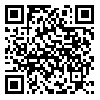BibTeX | RIS | EndNote | Medlars | ProCite | Reference Manager | RefWorks
Send citation to:
URL: http://ijml.ssu.ac.ir/article-1-23-en.html

 , Nourkhoda Sadeghifard
, Nourkhoda Sadeghifard 
 , Mohamadreza Ghasemi
, Mohamadreza Ghasemi 
 , Farzaneh Amin-Harati
, Farzaneh Amin-Harati 
 , Sedigheh Ghorchian
, Sedigheh Ghorchian 

Background and Aims: Clostridium difficile is an identified cause of antibiotic-associated diarrhea, antibiotic-associated colitis, pseudomembranous colitis and nosocomial diarrhea. The objective of this survey was to determine molecular analysis of toxigenic Clostridium difficile isolates from hospital environment in Tehran tertiary medical centers.
Materials and Methods: In this descriptive study, 100 hospital environmental specimens were collected. The specimens were cultured on a selective cycloserine cefoxitin fructose agar, and incubated in anaerobic conditions, at 37°C for 2 days. Clostridium difficile isolates were characterized by conventional biochemical tests. Bacterial cytotoxicity was assayed on tissue culture, and also all strains were typed by PCR ribotyping method.
Results: Among toxigenic Clostridium difficile isolates, 6 isolates had the same PCR ribotyping patterns, and 11 isolates were typed in four different groups.
Conclusions: Our findings showed that toxigenic Clostridium difficile isolates had different PCR ribotyping patterns. Further studies are recommended to evaluate PCR typing of hospital environmental Clostridium difficile isolates.
Received: 2014/12/23 | Accepted: 2014/12/23 | Published: 2014/12/23
| Rights and permissions | |
 |
This work is licensed under a Creative Commons Attribution-NonCommercial 4.0 International License. |



